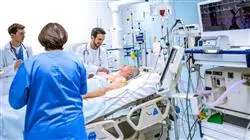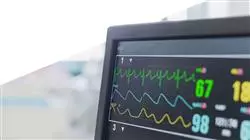University certificate
The world's largest faculty of medicine”
Introduction to the Program
Thanks to this complete program, you will master all the necessary competencies for Advanced Life Support in the Postoperative Period after Cardiovascular Surgery, with a 100% online methodology”

In today's complex health care scenario, postoperative cardiovascular surgery stands out as a critical area of care that requires specialized skills and knowledge. The increasing prevalence of cardiovascular procedures, together with the evolution of surgical techniques, has generated the need for highly qualified professionals. In this context, the present university program is presented as a comprehensive educational response to address the complexities inherent in the recovery of patients undergoing cardiac interventions.
This syllabus responds to the urgent demand for health professionals capable of managing critical situations specific to the Cardiovascular Postoperative period. In this way, the complexity of this scenario will be addressed, providing detailed knowledge in Monitoring and Advanced Life Support, highlighting the importance of a specialized approach.
From airway control to the interpretation of prognostic scales, the syllabus will cover fundamental aspects for an integral and effective care. In addition, it will focus on the practical application of neuromonitoring, hemodynamic and gas exchange monitoring, and ventilatory mechanics, offering a holistic approach to Postoperative Cardiovascular Care.
Within the framework of these specific challenges, the program consolidates itself as a unique opportunity for professionals who seek not only to understand the theoretical aspects, but also to apply effective strategies in clinical decision making. The demand for this type of specialization is supported by the complexity of current cardiac interventions and the critical need for high quality postoperative care.
Therefore, the methodology of the academic pathway will respond to the need for flexibility and efficiency in learning, being fully online. It will also adopt the innovative Relearningmethodology, whose approach will focus on the repetition of key concepts to strengthen the fixation of knowledge and facilitate continuous learning.
This Postgraduate diploma will prepare you for current and future challenges in Critical Care. Enroll now!”
This Postgraduate diploma in Advanced Life Support in the Postoperative Period after Cardiovascular Surgery contains the most complete and up-to-date scientific program on the market. The most important features include:
- Practice cases presented by experts in Advanced Life Support in the Postoperative Period after Cardiovascular Surgery
- The graphic, schematic, and practical content with which they are created, provide scientific and practical information on the disciplines that are essential for professional practice
- Practical exercises where the self-assessment process can be carried out to improve learning
- Its special emphasis on innovative methodologies
- Theoretical lessons, questions to the expert, debate forums on controversial topics, and individual reflection assignments
- Content that is accessible from any fixed or portable device with an Internet connection
You'll study from the comfort of your home and update your knowledge online with TECH, the world's largest digital university”
The program’s teaching staff includes professionals from the sector who contribute their work experience to this program, as well as renowned specialists from leading societies and prestigious universities.
The multimedia content, developed with the latest educational technology, will provide the professional with situated and contextual learning, i.e., a simulated environment that will provide immersive education programmed to learn in real situations.
This program is designed around Problem-Based Learning, whereby the professional must try to solve the different professional practice situations that arise during the academic year For this purpose, the students will be assisted by an innovative interactive video system created by renowned and experienced experts.
The interactive summaries of each topic will allow you to consolidate each of the concepts in a more dynamic way. Bet on TECH!"

In just 6 months, you will give your career the boost it needs thanks to this exclusive TECH Global University program"
Why study at TECH?
TECH is the world’s largest online university. With an impressive catalog of more than 14,000 university programs available in 11 languages, it is positioned as a leader in employability, with a 99% job placement rate. In addition, it relies on an enormous faculty of more than 6,000 professors of the highest international renown.

Study at the world's largest online university and guarantee your professional success. The future starts at TECH”
The world’s best online university according to FORBES
The prestigious Forbes magazine, specialized in business and finance, has highlighted TECH as “the world's best online university” This is what they have recently stated in an article in their digital edition in which they echo the success story of this institution, “thanks to the academic offer it provides, the selection of its teaching staff, and an innovative learning method aimed at educating the professionals of the future”
A revolutionary study method, a cutting-edge faculty and a practical focus: the key to TECH's success.
The most complete study plans on the university scene
TECH offers the most complete study plans on the university scene, with syllabuses that cover fundamental concepts and, at the same time, the main scientific advances in their specific scientific areas. In addition, these programs are continuously being updated to guarantee students the academic vanguard and the most in-demand professional skills. In this way, the university's qualifications provide its graduates with a significant advantage to propel their careers to success.
TECH offers the most comprehensive and intensive study plans on the current university scene.
A world-class teaching staff
TECH's teaching staff is made up of more than 6,000 professors with the highest international recognition. Professors, researchers and top executives of multinational companies, including Isaiah Covington, performance coach of the Boston Celtics; Magda Romanska, principal investigator at Harvard MetaLAB; Ignacio Wistumba, chairman of the department of translational molecular pathology at MD Anderson Cancer Center; and D.W. Pine, creative director of TIME magazine, among others.
Internationally renowned experts, specialized in different branches of Health, Technology, Communication and Business, form part of the TECH faculty.
A unique learning method
TECH is the first university to use Relearning in all its programs. It is the best online learning methodology, accredited with international teaching quality certifications, provided by prestigious educational agencies. In addition, this disruptive educational model is complemented with the “Case Method”, thereby setting up a unique online teaching strategy. Innovative teaching resources are also implemented, including detailed videos, infographics and interactive summaries.
TECH combines Relearning and the Case Method in all its university programs to guarantee excellent theoretical and practical learning, studying whenever and wherever you want.
The world's largest online university
TECH is the world’s largest online university. We are the largest educational institution, with the best and widest online educational catalog, one hundred percent online and covering the vast majority of areas of knowledge. We offer a large selection of our own degrees and accredited online undergraduate and postgraduate degrees. In total, more than 14,000 university degrees, in eleven different languages, make us the largest educational largest in the world.
TECH has the world's most extensive catalog of academic and official programs, available in more than 11 languages.
Google Premier Partner
The American technology giant has awarded TECH the Google Google Premier Partner badge. This award, which is only available to 3% of the world's companies, highlights the efficient, flexible and tailored experience that this university provides to students. The recognition as a Google Premier Partner not only accredits the maximum rigor, performance and investment in TECH's digital infrastructures, but also places this university as one of the world's leading technology companies.
Google has positioned TECH in the top 3% of the world's most important technology companies by awarding it its Google Premier Partner badge.
The official online university of the NBA
TECH is the official online university of the NBA. Thanks to our agreement with the biggest league in basketball, we offer our students exclusive university programs, as well as a wide variety of educational resources focused on the business of the league and other areas of the sports industry. Each program is made up of a uniquely designed syllabus and features exceptional guest hosts: professionals with a distinguished sports background who will offer their expertise on the most relevant topics.
TECH has been selected by the NBA, the world's top basketball league, as its official online university.
The top-rated university by its students
Students have positioned TECH as the world's top-rated university on the main review websites, with a highest rating of 4.9 out of 5, obtained from more than 1,000 reviews. These results consolidate TECH as the benchmark university institution at an international level, reflecting the excellence and positive impact of its educational model.” reflecting the excellence and positive impact of its educational model.”
TECH is the world’s top-rated university by its students.
Leaders in employability
TECH has managed to become the leading university in employability. 99% of its students obtain jobs in the academic field they have studied, within one year of completing any of the university's programs. A similar number achieve immediate career enhancement. All this thanks to a study methodology that bases its effectiveness on the acquisition of practical skills, which are absolutely necessary for professional development.
99% of TECH graduates find a job within a year of completing their studies.
Postgraduate Diploma in Advanced Cardiovascular Surgery Postoperative Life Support
Thanks to advanced life support in postoperative cardiovascular surgery (SVAPCC) it is possible to ensure the successful recovery of patients after cardiac interventions. Are you looking to hone your skills in these environments? TECH Global University has the ideal option for you. Through the Postgraduate Diploma in Advanced Life Support in Postoperative Cardiovascular Surgery, you will acquire advanced knowledge and specialized practices to provide exceptional care to patients undergoing this procedure. In this program, taught 100% online, you will explore the essential fundamentals of postoperative life support in cardiovascular surgery. This module establishes the foundation for understanding the specific needs of patients after cardiac interventions. You will also learn how to use advanced monitoring technologies to assess and manage postoperative patients. This module focuses on data interpretation, early identification of complications, and informed decision making to improve clinical outcomes.
The module is designed to help you learn how to interpret data, identify complications early, and make informed decisions to improve clinical outcomes.
Learn about advanced life support in postoperative cardiovascular surgery
TECH is not only the best digital university in the world according to prestigious media such as Forbes, but it is also home to one of the largest medical schools, where we are responsible for training high-profile professionals so they can improve both their income, knowledge and skills. That's why we bring you, hand in hand with experts in the field, the best postgraduate degree you'll find to optimize your resume. In your academic journey, you will explore strategies for the management of specific complications related to cardiovascular surgery. From arrhythmias to heart failure, this module addresses critical situations, providing practical tools for rapid and effective intervention. Upon completion of this program, you will become an expert in advanced life support in the postoperative cardiovascular surgery setting, capable of leading teams and providing exceptional care at critical times. Join us and make a difference in the recovery of post-cardiovascular surgery patients. Enroll now and take your skills to the next level!







